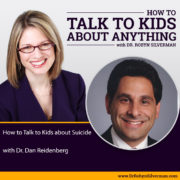Pros and Cons of Children in Sports: Dr. Robyn Silverman on The Today Show
The Today Show brought me on today to kick off a series on children and sports along side football player, Greg Jennings!
What are some of the benefits that children gain from playing sports?
There are so many reasons why sports are great for kids, from the obvious physical reasons to learning social skills to lowering the probability of engaging in risky behavior like drug abuse. But one of my favorite benefits of sports and one I love to present about to children and adults—is that sports can help develop character and grit in children—teaching them to set goals, go after them, overcome barriers and showing them that if these kids dig deep, they have what it takes to achieve those goals.
There are so many pressures placed on the parents and the kids. If you want your child to be the best, you need to get the private coaches or you need to have them practice five days per week. At what point is enough, enough?
First, I think one of the key phrases we need to illuminate here is “if YOU want your child to be the best.” Children have to be as invested (or more) in their particular sport as their parents are or “enough is enough” is going to come way too quickly. Sports are about the children and the team, rather than the parents’ goals.
That aside, a good parent often knows when their child has had too much. When your child’s grades are plummeting, they always seem exhausted, overwhelmed, agitated and physically unwell, they have no time for friends, family or the other things they love, it is likely time to help them re-evaluate their priorities and what they truly want to do. We want our children to learn grit, character and the keys to success, but we don’t want to compromise their long-term mental or physical health.
What are some of the sacrifices families may need to discuss when children are involved with sports?
Sports can provide so many wonderful learning and health opportunities from physical strength, flexibility and endurance to mental strength, powerful character and lowered risky behavior. Sports can be wonderful for children!
However, especially as the child grows and becomes more competitive in sports or involved in certain sports, time, money and energy will be allocated to this particular sport for this particular child. That means the time, money and energy will not be allocated elsewhere. Some sacrifices may be unstructured playtime, down time, extra homework time, sleep and other activities that your child also wishes s/he’d be allowed to do. Lay them out on the table with all those who will be impacted in the family (the driver, the parent who has to wake up or travel with the child, the parent paying, the child) and decide if the sacrifices are worth it before you move forward.
How can children balance their schedule?
Competitive sports can get intense. And while our children are  involved in sports, we also want them to stay on top of their academics, spend time with friends and family, relax and engage in other activities that they love. But our children can’t do everything. Some options to think about are (1) Limit the number of competitive sports to one (or maybe two if they are seasonal) per year, (2) Consider recreational sports instead of competitive ones or do a combination of each, (3) Schedule in breaks during the week or during the year when the pressure is off and the children can just be children.
involved in sports, we also want them to stay on top of their academics, spend time with friends and family, relax and engage in other activities that they love. But our children can’t do everything. Some options to think about are (1) Limit the number of competitive sports to one (or maybe two if they are seasonal) per year, (2) Consider recreational sports instead of competitive ones or do a combination of each, (3) Schedule in breaks during the week or during the year when the pressure is off and the children can just be children.
How do we know if children are in sports for the right reasons?
Why are your children in sports? There are clearly many benefits, however, we want to make sure our children are involved in sports in which they love and they want to participate.
As parents it’s vital that we don’t;
(1) Live vicariously through our children. The question is, are they doing it for themselves or are they doing it for you?
(2) Merge with our children. Meaning, don’t allow the sport to become more important to you than to the child. When we take over their responsibilities, attend every practice and game, talk about the sport all the time, coach them and say things like “we had a great practice today” and “we have a game on Saturday.”
(3) Wig out. If your moods depend on your children winning or losing or you find yourself screaming at the children or the coaches during the games, you may need to take a step back.
For all the parents out there, what is the most important thing to keep in perspective?
Our children aren’t all going to be Olympians and world class athletes. And that’s OK! Remember that sports are supposed to be fun and teach kids about life and themselves—they’re not all about fame, fortune and winning.














